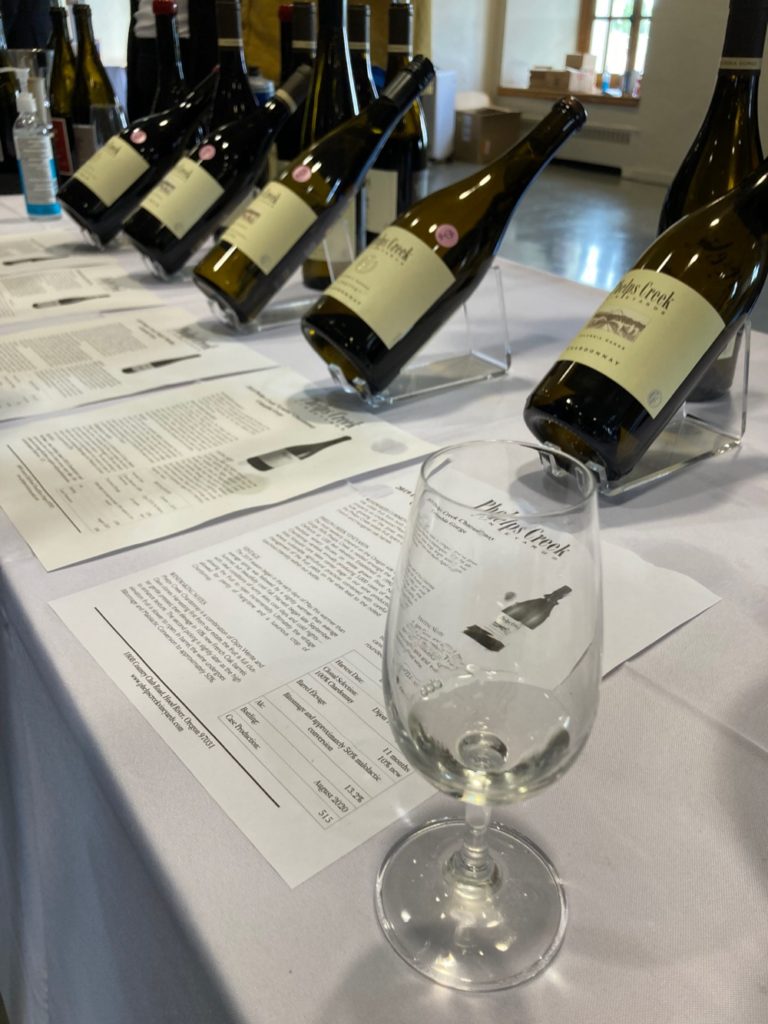
“Who imports this wine?” I asked the person standing behind the Troon Vineyards table at a wine tasting of Washington and Oregon wines in Montreal last week.
“Flor,” said the man, smiling as though he had a lot of respect for the company I’d embarrassingly never heard of. But then I did something really stupid. I broke the business card etiquette rule of always reading the name on the card when someone hands it to you. If I had read it, I would have seen that the person handing me the card was Keaton Ritchie, the highly respected sommelier from Larry’s restaurant, who I’d never met in real life… until now.
It turns out, since launching a wine club through Larrys during the pandemic, he’s now launched his own private import agency (or maybe he had already launched it) with 9 wineries and an Ontario ciderie, all low intervention and likely exceptional on board.
My coup de coeur of the tasting salon was the Rhone-inspired white blend of Viognier, roussanne and Marianne and the fruity but dry red blend of Zinfandel, temperanillo and Malbec) that he imports from regenerative Oregon winery Troon Vineyard. Ritchie’s own descriptions and tasting notes for the white blend are better than mine:
I did catch the salivating acidity and salty finish he mentions for the white blend. And I also caught the reasonable price tag of $31/bottle + tax for a case of 12 in Quebec.
The red, below, had a beautiful freshness from the Zinfandel balanced with just enough fruit from the Malbec with soft tannins that gear up at the end (from the tempranillo?). It’s 13.6%, fairly high alcohol, but doesn’t taste hot or monstrously big like a lot of California reds. This is Oregon, after all, though just north of the California border.
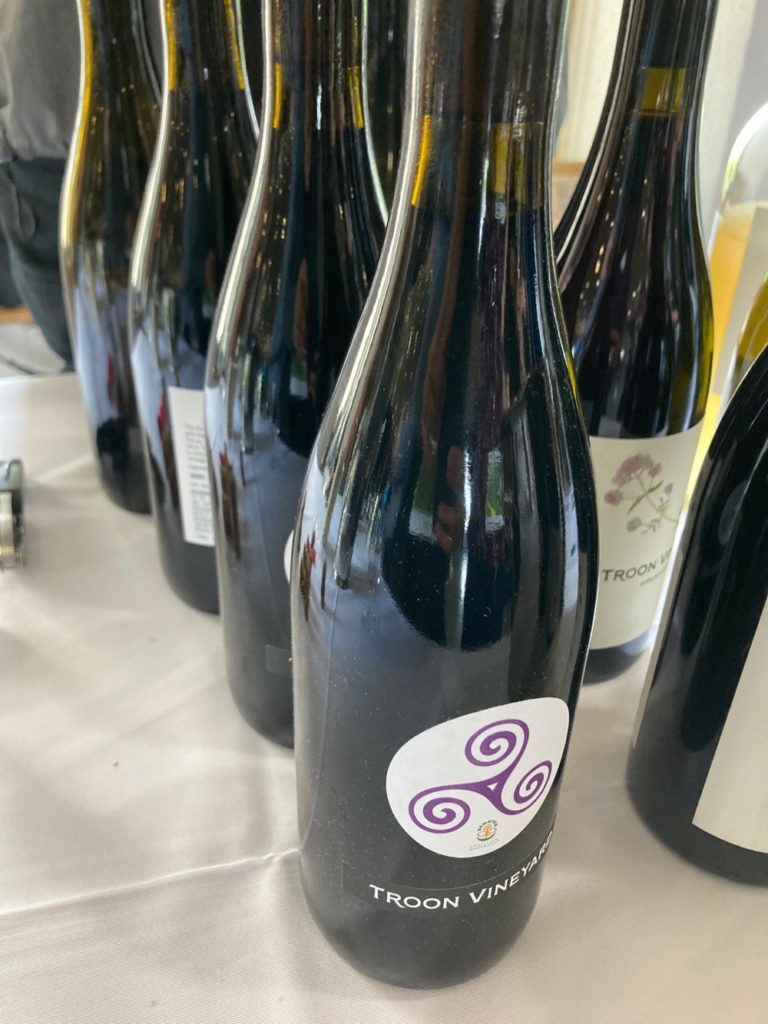
What does regenerative wine-making mean?
Part of it (at Troon anyway) means having sheep and chickens rotating through the vines adding nutrients and eating unwanted things, but keeping them away from the vines when the plants are growing. It means planting apple trees and cover crops and leaving the soil healthier after every harvest than it was before, despite the nutrient needs of the vines.
I also tried the amphora macerated wine but after tasting a red, I couldn’t appreciate it as I would have liked. It’s hard to go back after you’ve had big tannins and fruit. It’s also 57$ a bottle with a limited amount in Quebec, so with Ritchie’s reputation and established clientele, and Montreal’s love of skin-macerated wines and amphora, I get why this one was not being prominently displayed on the table. He’ll likely have no trouble selling it.
The Oregon Food
This tasting event wasn’t just about wines (don’t worry, more on those below). I was surprised to find so many Oregon food producers present. That’s a long trip to sell some award-winning sauerkraut, sustainable fish jerky (gently seasoned, not overly salted Alaskan pollock and Pacific rockfish) and water-friendly hazelnut butter (as opposed to water-intense almonds).
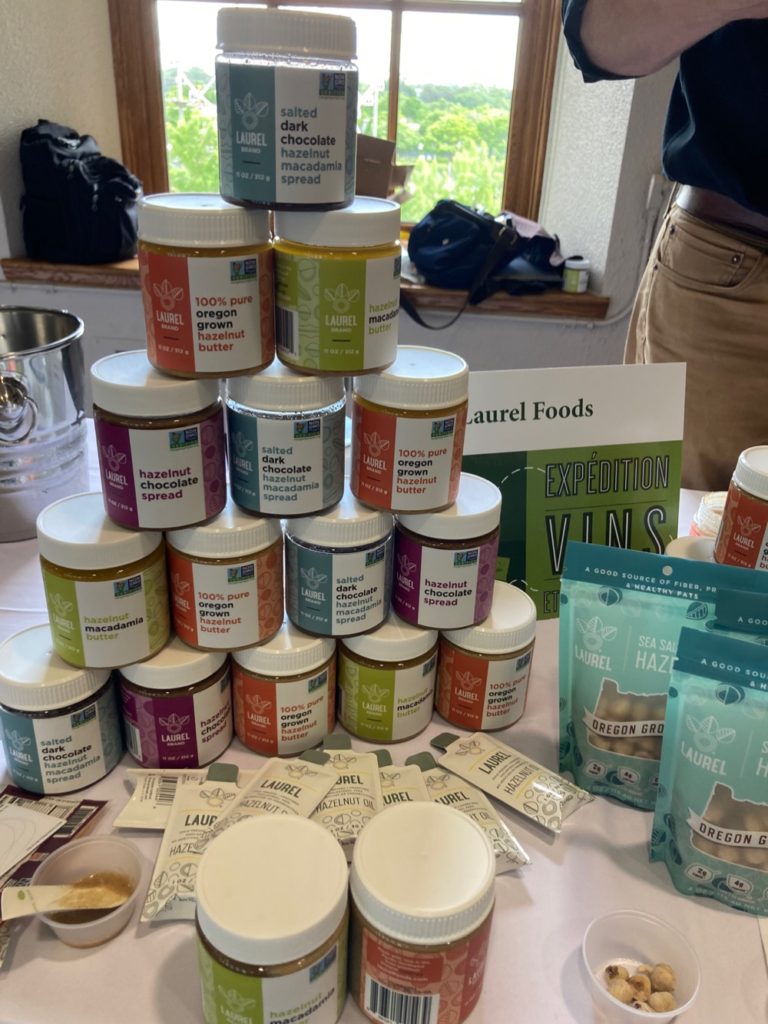
The hazelnut butter, macadamia nut butter, roasted and seasoned hazelnuts and hazelnut oil from Laurel Foods came with a lesson in sustainability. We hear so much about how unsustainable California almonds are because of irrigation and hurting bee colonies that need to be dragged through the fields to pollinate. But hazelnuts are wind pollinated and don’t require the same amount of water brought in, said the marketing agent since Oregon has more lakes and precipitation. These will hopefully be coming to Quebec stores soon. For now, the company ships the bulk hazelnuts only through its website and Amazon store. They also sell a Nutella-inspired chocolate-hazelnut spread, for those who like their toast sweet and nutty.
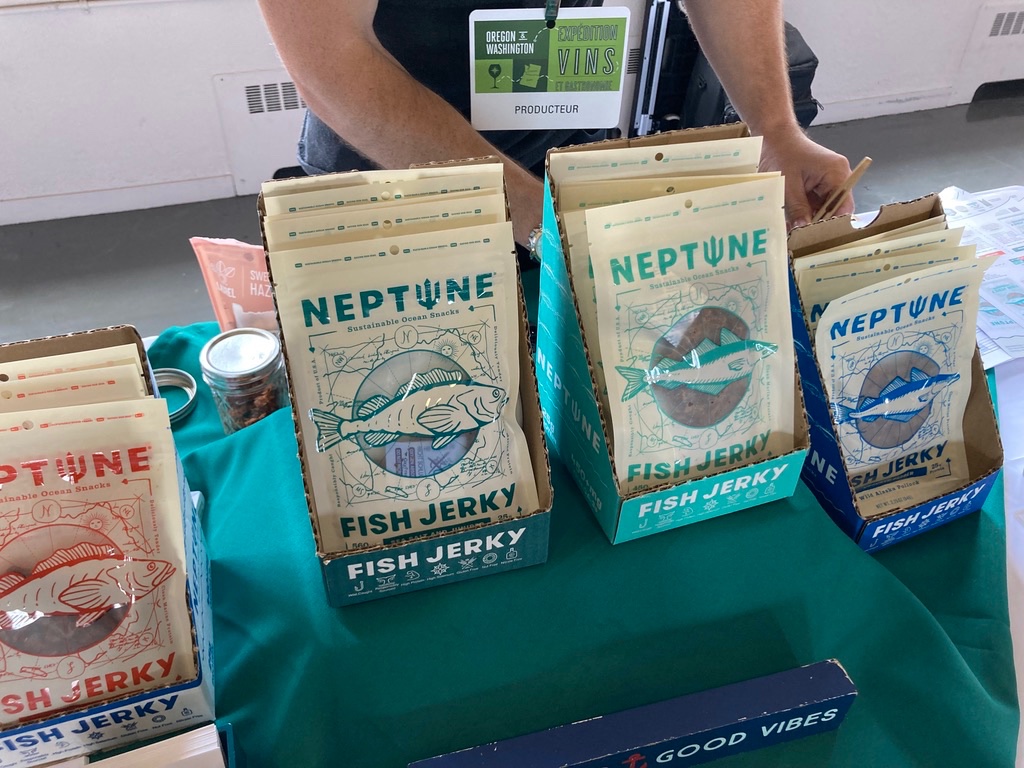
This fish jerky was probably my favourite discovery of the event. As a Newfoundlander, I’m strongly opposed to unsustainable seafood being sold willy-nilly. But deciding what’s sustainable and what’s not is often hard, even if it’s certified by some reputable body. This is a product I’d actually buy, partly because I think the owner of this company is even more passionate about sustainable fish than I am, so I trust him completely. I actually bit my tongue from proposing on the spot.
It wouldn’t work – marriage – my wine-touched mind thought. He lives in Oregon, I live here. Even after sampling (and spitting) four white wines (not because they were bad, but because that’s very acceptable and expected at tasting events), I’m still thinking about practicalities. I’m also still unmarried. Which is fine.
So I did not propose to the (like relieved) man. But this is what I found out about him (Neptune’s founder, Nick Mendoza) afterwards on the company’s website: He worked for Stanford in marine science and sustainable aquaculture before founding the company, a mission that “took him to 8 countries and on 3 trans-Pacific research expeditions… Nick Mendoza became obsessed with inspiring people to fight for a better global seafood industry through something they could hold, touch, and taste. It took a return to his family’s cattle ranch in the Gila Wilderness of New Mexico to begin.”
Maybe he’s okay with long distance. Perhaps I should reconsider my proposal.
The website lists the sustainability of the fish, and you can enter your batch date on every package to find out where it came from. Overall, I love this company. I’m not saying I’d move to Oregon if he asked me, but I’d think about it. Especially with the easy access to sauerkraut:
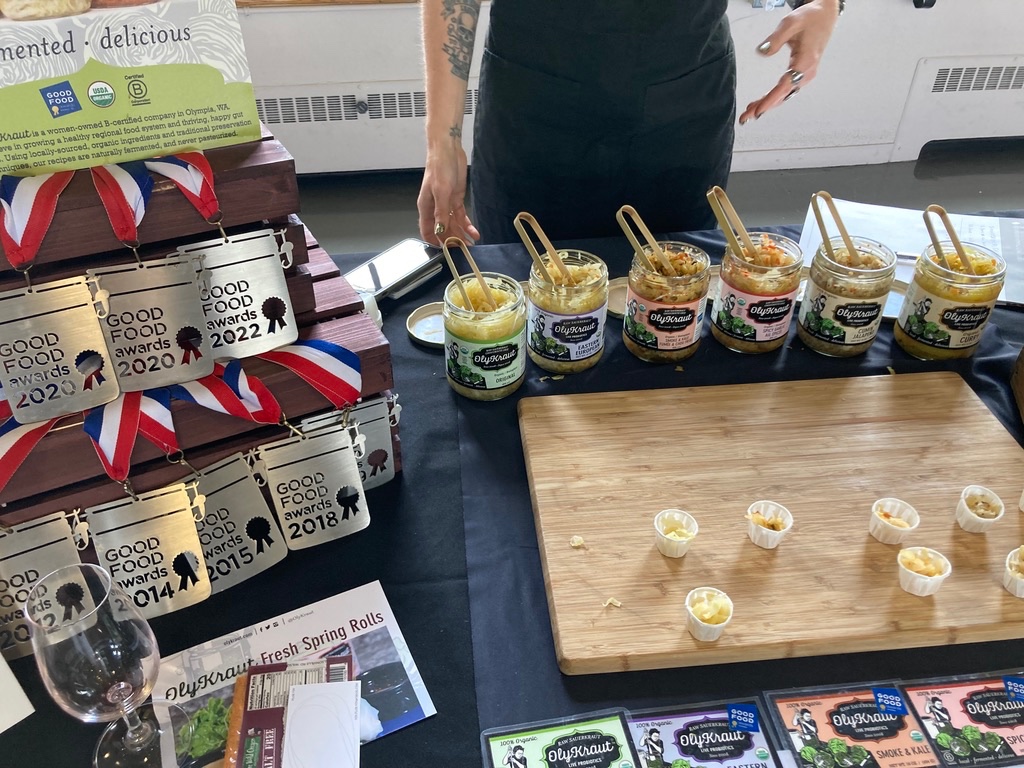
I love homemade sauerkraut. I love regular and I also love fresh turmeric in the curry flavour. And I love balanced flavours. This award-winning brand, OlyKraut, has it all, and will hopefully be coming to stores in Quebec soon. Goodness knows we could use the increased competition that organic and local food grocery stores are seeing in the US. More of these on shelves means more awareness. Think kombucha.
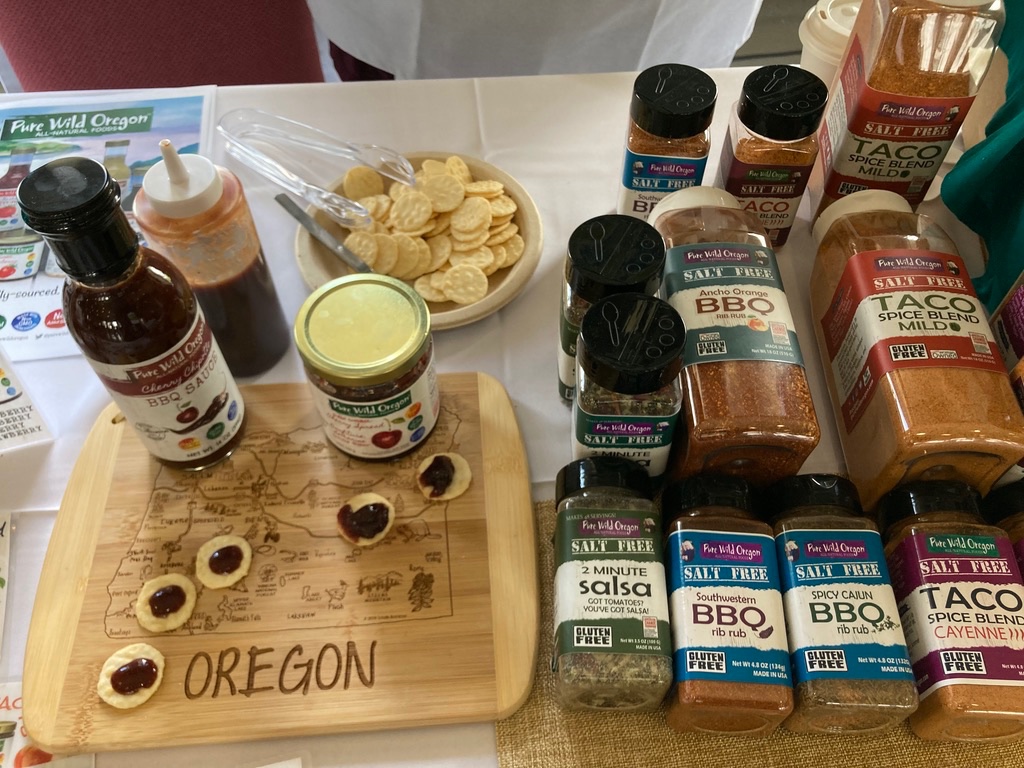
Then there was Pure Wild Oregon’s cherry chipotle barbecue sauce (gluten-free, dairy-free, with just enough raw sugar and no corn syrup) and gluten-free taco seasoning blend thickened with masa instead of flour.
The chipotle was sweet and the tiniest bit hot, nothing compared to the Aardvark Habanero Hot Sauce, a Caribbean/Tex-Mex hybrid based on tomatoes, white wine vinegar, habañeros and mustard. It was featured as the third hot sauce on Season 4 of The Hot Ones. The sauce at first tastes the tiniest bit sweet from the tomatoes and a sprinkle of cane sugar, but then the habañero comes up slowly as an after effect right when think it’s over. Loved it. Here’s the trailer for the Hot Ones season introducing the sauce:
The Other Biodynamic Wines
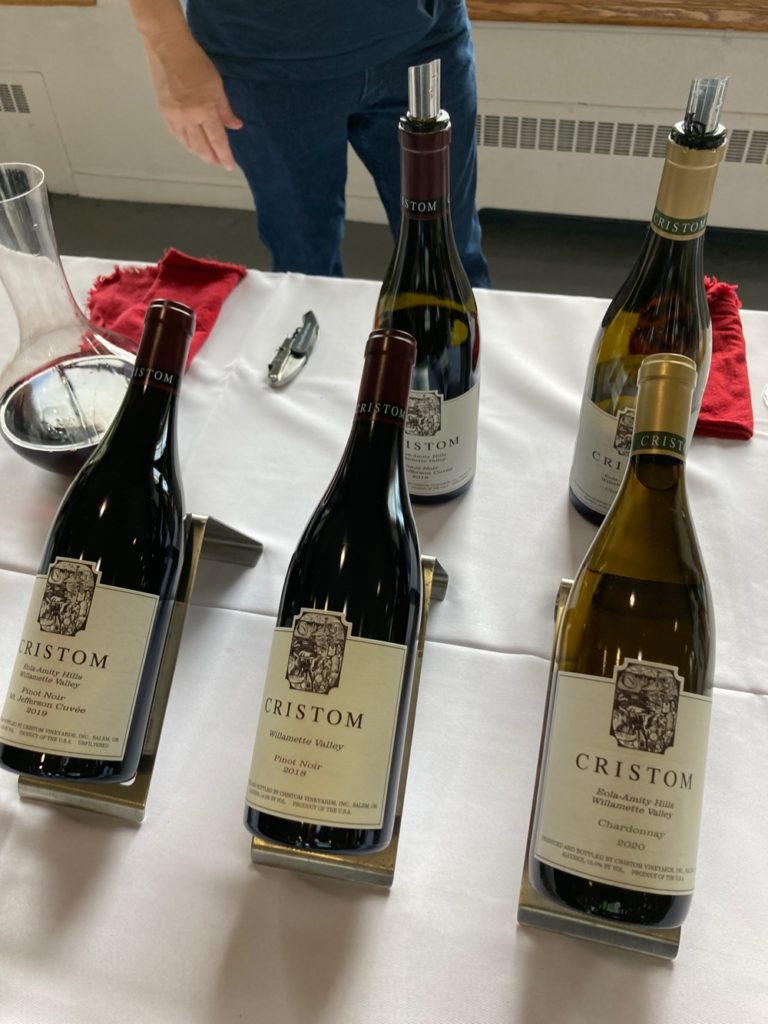
Enough about food, right? There were three other biodynamic and organic wine producers.
Christom (above), though uncertified, is a very good example of well-made Oregon Pinot Noir, I feel. It’s further north than Troon and intentionally Burgundian in style. These are expensive and meant for ageing (the 2018 is $48 at the SAQ and the 2019 is $58, with fairly high alcohol levels), but you can taste how these are gorgeous now and will only improve. Would I buy this over Burgundy? If I really loved Pinot, I’d at least want a few bottles to make the comparison five years down the line. DIY Judgment of Paris.
Then there’s Drouhin, with its own Burgundy connection. Add a couple of these to your list for that tasting in five years. Did I mention Oregon has volcanic soil? That gives it a freshness like Sicily and Greece that I like. I’m not sure if Burgundy has any volcanic soil. (Where’s Ritchie when I need him?) This Pinot Noir from Drouhin was lower acid than the others, which was a relief for my palate. I’d recommend te 2019 Dundee Hills appellation. It’s $50 at the SAQ. Another splurge, but essential for Pinot lovers.
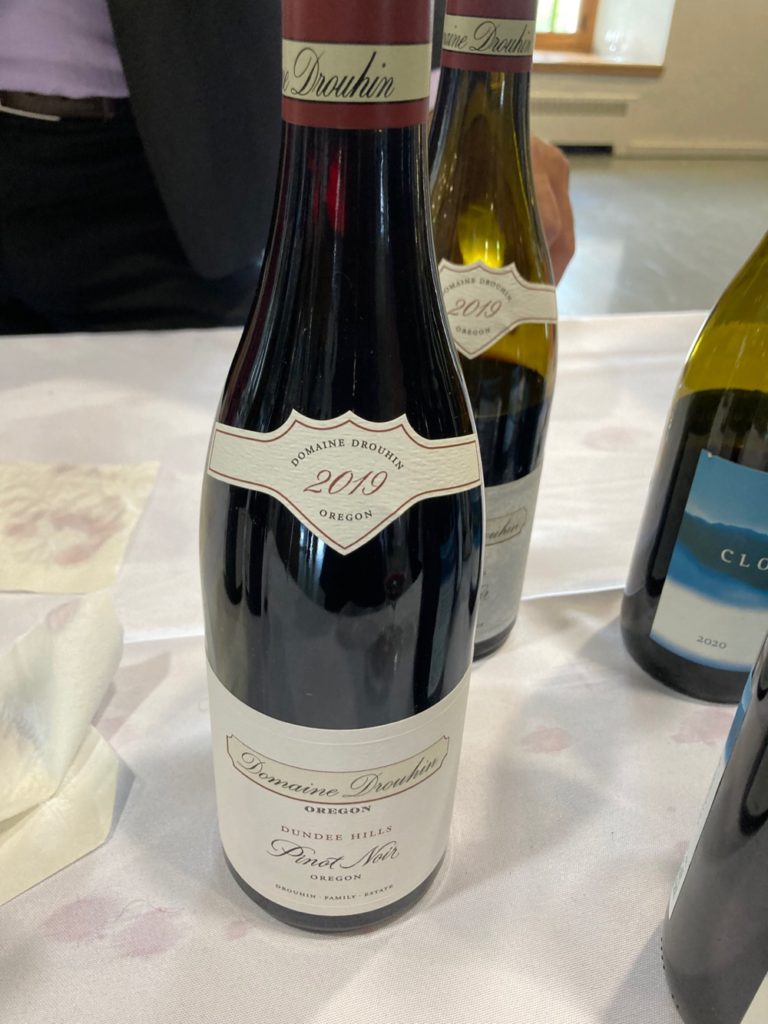
If you can’t to Oregon, you can at least be grateful for supply chains and international shipping. And dream.
Leave a Reply